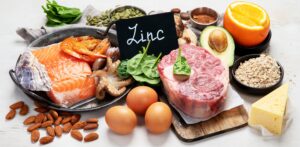How Zinc keeps kids healthy

Zinc is a hugely important mineral that influences our wellbeing in many ways.
Zinc is a mineral that plays a significant role in the growth, development, immunity and overall health of children. As parents, making sure that little ones are getting all the necessary vitamins, minerals and nutrients they need can feel like a full-time job! This article will focus on zinc, a key nutrient that profoundly impacts children’s wellbeing. Let’s explore why zinc is so essential for the growth, energy and vitality of kids.
Understanding Zinz
Zinc is not just another mineral; it’s an important piece of the nutrition puzzle for children! Let’s break it down.
Immune function
Zinc plays a vital role in supporting your child’s immune system. It helps to develop and activate T-lymphocytes, which are central to fighting off infections and illnesses. Ensuring that kids get enough zinc helps them maintain a robust immune response, keeping them healthy and reducing the likelihood of picking up bugs and viruses in the classroom.
Growth and development
Zinc is also essential for proper development during childhood. It supports cellular growth and division, which are critical processes during periods when your child is rapidly growing, such as infancy and teenagehood. Adequate zinc intake is vital for good physical health, including robust organs and tissues.
Cognition
Zinc plays an important part in brain health, impacting neurotransmitter function and cognitive development. It is involved in processes that affect learning, memory and attention, making it a brilliant addition to your little one’s term-time nutrition! Giving children enough zinc is a great way to support their academic performance and ability to learn and understand new information.
Skin health
Zinc contributes to keeping children’s skin healthy and strong, by promoting good healing and reducing inflammation. It can be beneficial in treating and preventing skin conditions, such as rashes, flare-ups and other issues, making it a great boost to children’s overall skin health.
Preventing deficiency
Zinc deficiency can lead to various health issues, including slow growth, weakened immune response and increased susceptibility to infections, so it’s really important to get enough of this powerful mineral into your child’s diet!
Infants (0-1 years old)
For infants, breast milk or formula typically provides sufficient zinc for their needs. As solids are introduced, it’s good to incorporate zinc-rich foods into their diet to be sure they continue to meet their zinc requirements.
Toddlers (1-3 years old)
During the toddler years, children undergo rapid growth and development, meaning zinc intake is critical. A balanced diet rich in zinc supports their immune function, growth and brain development. On the other hand, insufficient zinc can lead to developmental delays and increased vulnerability to infections.
Effects of deficiency in toddlers:
- Stunted growth
- Frequent infections
- Mood swings
- Low energy
Good sources of zinc for toddlers:
- Lean beef, pork and lamb
- Chicken and turkey
- Fish and shellfish
- Beans and lentils
- Milk, yoghurt and cheese
Incorporating these zinc-rich foods into toddler-friendly meals can make a significant difference in your little one’s zinc intake, helping them to blossom into a healthy, sturdy child.
Childhood (4-13 years old)
As children transition through childhood, their zinc needs remain high. Establishing healthy eating habits with zinc-rich options becomes more important, ensuring they have the energy and focus to thrive in their daily activities and succeed at any sports or academic challenges they face.
Effects of deficiency in childhood:
- Impaired growth
- Weakened immunity
- Poor learning and attention span
Good sources of zinc for childhood:
- Meat
- Poultry
- Salmon
- Shellfish
- Beans, lentils and chickpeas.
- Dairy
- Almonds, pumpkin seeds and sunflower seeds
By incorporating these foods into meals and snacks, you can help prevent deficiencies and keep your child’s growing body nourished and strong.
Adolescence
As children enter adolescence, rapid growth spurts and hormonal changes make their nutritional intake especially significant. Zinc plays a vital role during this time, supporting teens’ physical growth and mental development as they navigate the challenges of becoming adults.
Effects of deficiency in teens:
- Shorter height
- Increased illness
- Poor recall and concentration
New sources of zinc for teens:
- Oysters
- All legumes
- Walnuts
- Chia seeds
Encouraging your teen to make good food choices and emphasising the importance of a balanced diet can help them meet their zinc needs during this important stage of development.
Family meals: What to consider
Incorporating zinc-rich foods into your family meals is an excellent way to ensure children of all ages receive enough of this essential mineral. Here are some simple tips to consider when planning your household’s shared meals:
Plan for balance
Mealtimes can be a delightful journey with zinc-rich foods taking centre stage! Create a weekly meal plan that includes various zinc sources to help your family meet their needs. Focus on meats, poultry, seafood, legumes, dairy and whole grains for a balanced diet.
Get creative!
Make meals fun by experimenting with different recipes and cooking methods to make zinc-rich foods more appealing to kids. Try grilling chicken, making bean tacos or adding lentils to pasta dishes.
Zinc-fortified foods
When grocery shopping, look for zinc-fortified cereals and grain products. These easy swaps can help boost your family’s zinc intake without much effort.
Nutritious snacks
Keeping a selection of zinc-rich snacks on hand is a straightforward way to ensure your children are getting enough of this vital mineral. Opt for snacks like yoghurt with nuts, whole grain crackers or nut butter on toast.
Zinc is essential for a child’s diet, supporting their health from infancy through adolescence. Deficiencies can have significant consequences on their physical and cognitive development, but by implementing these tips, you’ll be well able to provide your family with the zinc they need to flourish!
Image Credit: ShutterStock











Comments